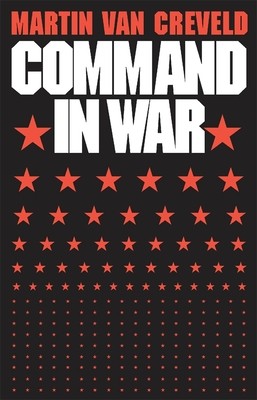
- We will send in 10–14 business days.
- Author: Martin Van Creveld
- Publisher: Harvard University Press
- Pages: 339
- ISBN-10: 0674144414
- ISBN-13: 9780674144415
- Format: 15.2 x 23.1 x 2.5 cm, minkšti viršeliai
- Language: English
- SAVE -10% with code: EXTRA
Reviews
Description
Many books have been written about strategy, tactics, and great commanders. This is the first book to deal exclusively with the nature of command itself, and to trace its development over two thousand years from ancient Greece to Vietnam. It treats historically the whole variety of problems involved in commanding armies, including staff organization and administration, communications methods and technologies, weaponry, and logistics. And it analyzes the relationship between these problems and military strategy.
In vivid descriptions of key battles and campaigns--among others, Napoleon at Jena, Moltke's Königgrätz campaign, the Arab-Israeli war of 1973, and the Americans in Vietnam--Martin van Creveld focuses on the means of command and shows how those means worked in practice. He finds that technological advances such as the railroad, breech-loading rifles, the telegraph and later the radio, tanks, and helicopters all brought commanders not only new tactical possibilities but also new limitations.
Although vast changes have occurred in military thinking and technology, the one constant has been an endless search for certainty--certainty about the state and intentions of the enemy's forces; certainty about the manifold factors that together constitute the environment in which war is fought, from the weather and terrain to radioactivity and the presence of chemical warfare agents; and certainty about the state, intentions, and activities of one's own forces. The book concludes that progress in command has usually been achieved less by employing more advanced technologies than by finding ways to transcend the limitations of existing ones.
EXTRA 10 % discount with code: EXTRA
The promotion ends in 23d.07:33:40
The discount code is valid when purchasing from 10 €. Discounts do not stack.
- Author: Martin Van Creveld
- Publisher: Harvard University Press
- Pages: 339
- ISBN-10: 0674144414
- ISBN-13: 9780674144415
- Format: 15.2 x 23.1 x 2.5 cm, minkšti viršeliai
- Language: English English
Many books have been written about strategy, tactics, and great commanders. This is the first book to deal exclusively with the nature of command itself, and to trace its development over two thousand years from ancient Greece to Vietnam. It treats historically the whole variety of problems involved in commanding armies, including staff organization and administration, communications methods and technologies, weaponry, and logistics. And it analyzes the relationship between these problems and military strategy.
In vivid descriptions of key battles and campaigns--among others, Napoleon at Jena, Moltke's Königgrätz campaign, the Arab-Israeli war of 1973, and the Americans in Vietnam--Martin van Creveld focuses on the means of command and shows how those means worked in practice. He finds that technological advances such as the railroad, breech-loading rifles, the telegraph and later the radio, tanks, and helicopters all brought commanders not only new tactical possibilities but also new limitations.
Although vast changes have occurred in military thinking and technology, the one constant has been an endless search for certainty--certainty about the state and intentions of the enemy's forces; certainty about the manifold factors that together constitute the environment in which war is fought, from the weather and terrain to radioactivity and the presence of chemical warfare agents; and certainty about the state, intentions, and activities of one's own forces. The book concludes that progress in command has usually been achieved less by employing more advanced technologies than by finding ways to transcend the limitations of existing ones.


Reviews